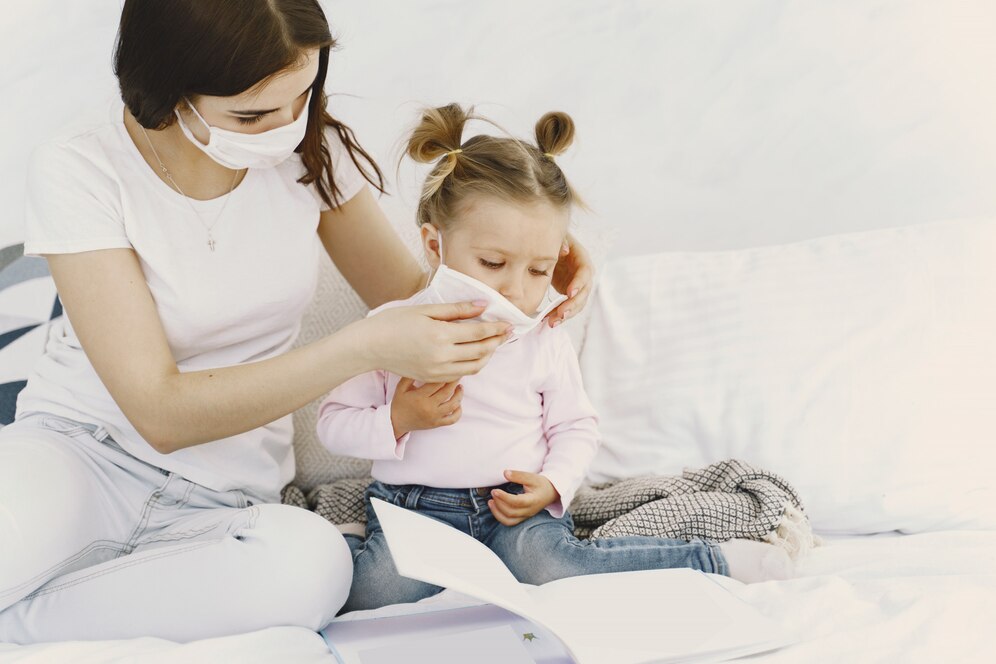
Recognising and Managing Common Childhood Illnesses
As a parent, when it comes to baby ailments, few things are more worrisome than when your little one is sick. From sniffles and fevers to rashes and upset stomachs, children are particularly susceptible to getting sick during their early years when their immune systems are not yet fully developed. Knowing the signs, symptoms and treatment options for common baby illnesses prepares you to react with confidence and care when the sickness hits home.
This is a practical toddler health guide blog to clear the confusion around toddler health issues, and help you through the tough moments.We’ll address some of the most commonly observed childhood ailments for instance, colds, ear infections, and stomach bugs and offer advice on when to treat at home and when to see a doctor.
If you have the right information and tools, managing childhood sickness is a bit less daunting. Our aim is to help you make informed choices, support your child better, and keep your family healthier, all season long. This blog will help you throughout to ease and understand your child sickness.
Managing Childhood Sickness
How to handle them? First, early recognition of symptoms leads to early treatment that can reduce the severity and duration of the illness. Second, understanding how to deal with these illnesses alleviates stress and anxiety in the child and caregiver. Finally, good health habits help prevent infections from spreading, thereby protecting your child and others in the community.

Real-Life Applications
This is a testing time for parents when a child falls ill. Identifying symptoms of common illnesses, such as colds, flu and ear infections as it helps parents find the right medical advice fast. A high fever accompanied by a rash, for instance, could indicate a serious illness, such a case of measles, resulting in swifter treatment and a better outcome. Children under five are particularly susceptible to respiratory infections, which are among the most common reasons for visits to hospitals in this age group, data has shown. Knowing how to treat these conditions at home can reduce hospital visits and often allow for a much more comfortable recovery.
Additional Tips & Common Mistakes to Avoid
Best Practices for Managing Childhood Illnesses
- Stay Informed: Keep up with health guidelines and recommendations for childhood illnesses. This includes vaccination schedules to prevent diseases like measles, mumps, and rubella.
- Maintain Good Hygiene: Teach kids to wash their hands often, especially after using the toilet and before meals. This practice can greatly lower infection spread.
- Monitor Symptoms: Watch your child’s symptoms closely. If they worsen or don’t improve in a few days, seek medical advice. Trust your instincts; you know your child best.
- Ensure Rest and Hydration: Encourage your child to rest and drink lots of fluids to help their body fight the illness.
Common Mistakes and Misconceptions
- Over-Medicating: Don’t give kids over-the-counter meds without consulting a healthcare professional. Some aren’t safe for young children and can cause problems.
- Ignoring Symptoms: Dismissing symptoms as ‘just a cold’ can be risky. Always monitor your child’s condition and seek medical help if you’re worried.
- Not Isolating the Sick Child: If your child is contagious, keep them home to avoid spreading the illness to others.
Advanced Insights
Unique Industry Perspectives
Healthcare professionals stress a holistic approach to managing childhood illnesses. This means treating symptoms while also supporting the child’s emotional and mental well-being. Illness can be scary for a child, so offering comfort and reassurance is just as important as medical care.
Lesser-Known Insights
Did you know the gut is vital for a child’s immune system? A diet rich in fruits, vegetables, and probiotics supports gut health, helping kids fight off infections. Encouraging a balanced diet early on can benefit a child’s long-term health.

Guiding Your Child Through Sick Days
Navigating the ups and downs of childhood health can feel overwhelming, but being informed makes all the difference. By identifying symptoms early and knowing how to respond, you can alleviate your child’s discomfort and recover more quickly. From fevers to runny noses, knowing common baby illnesses gives you the knowledge you need to determine when to treat at home and when to see a doctor.
This toddler health guide was created to help you navigate those uncertain times with advice for you: symptom checks and care tips. But as any parent knows, there’s no way to stop every illness, so it’s important to understand how to care for your little one to reassure them when they’re sick builds confidence and reduces stress.
Keep in mind that childhood illness management isn’t just about therapy it’s about comfort, prevention and showing up when your child needs you the most. Get stay ready for, trust your gut, and notify health brigade when you’re unsure. You can do this and your child’s health is in caring, efficient hands.
Share your experience with everybody tell us in the comment section your little angels ups & downs.